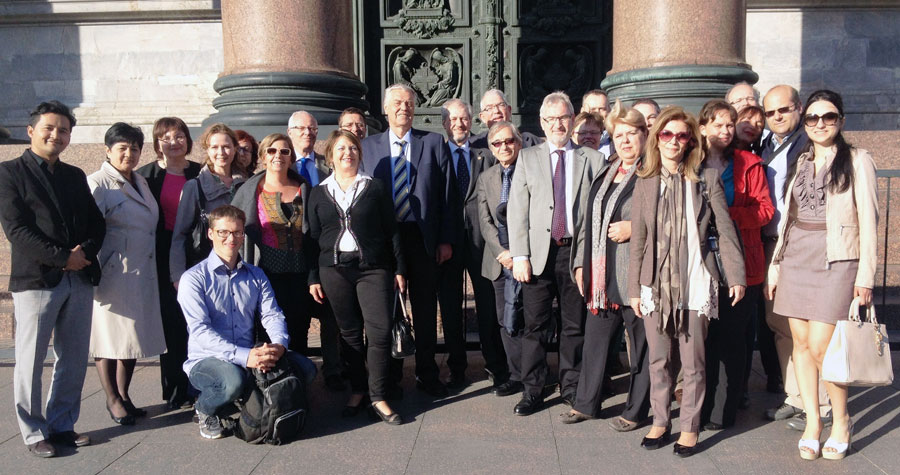
On May 16–17 2014 the 22nd “European Investigators on Chronic Myeloid Leukemia (EI-CML)” meeting was held in Saint Petersburg. Annually since 1992 EI-CML scientists gather together to discuss the most difficult and unresolved issues in chronic myeloid leukemia (CML) research.
CML is an orphan disease, the incidence of which in population is less than 2 cases per 100,000 people. In this regard it is impossible to conduct research without collaboration, for example, merging of databases. In addition to this all current research projects demand high-tech research methods and are thus extremely expensive. Consequently pooling of efforts of several countries is often needed for meaningful results.
Usually during EI-CML meetings each of CML experts makes a short presentation on the results of ongoing research and suggests plans for further work. Along with this the possibilities for merging of efforts and creation of international research groups are discussed. In general EI-CML format allows scientists to find each other and make plans for future joint work.
This year for the first time the host of the conference was a post-Soviet state. EI-CML 2014 was initially planned to be held in Kiev by prof. I. Dyagil. However, because of the difficult situation in Ukraine, it was decided to transfer the conference to St. Petersburg and to conduct it under the guidance of prof. A. Zaritskiy. The meeting was organized with the support of European Leukemia Net and its leader prof. R. Hehlmann.
Event was attended by scientists from 11 countries: Austria (J. Thaler), United Kingdom (S. O'Brien), Germany (R. Hehlmann, M. Pfirrmann, S. Saussele, V. Shlyakhto), Greece (T. Kalmantis, M. Kalmanti), Israel (A. Nagler), Italy (E. Abruzzese), Netherlands (J. Janssen), Portugal (M. Abecasis), Russia (S. Kulikov, E. Chelysheva, B. Afanasiev, E. Morozova, I. Martynkevich, V. Shuvaev, A. Lavrov, A. Zaritskiy, A. Dubina, E. Lomaia, P. Butylin), Uzbekistan (K. Kazakbaeva, C. Saliev) and France (F. Rousselot). During the meeting scientists discussed ongoing research projects conducted under their supervision and planned topics for future scientific research. Cooperation in the following areas has been discussed:
- Comparison of EUTOS population registry data with population registry of the Russian Federation (Pfirrmann, Kulikov);
- Comparative toxicity profile of imatinib and dasatinib (O’Brien, Hehlmann, Thaler).
- Pharmacoeconomics of TKIs (Shuvaev, Kalmantis);
- Studies on TKI discontinuation (Saußele, Rousselot, Chelysheva);
- Registry of cases of pregnancy on TKI therapy (Abruzzese, Chelysheva, Kazakbaeva);
- TKIs before and after allogeneic SCT (Nagler, Saußele, Afanasyev, Morozova);
- Early prediction of CML progression by DNA sequencing (Lavrov);
- Vascular effects of TKI therapy (Lomaia, Abruzzese, O’Brien, Saußele. Discussion with other European leaders — Hochhaus and Le Coutre — is also planned);
- The role of the dynamics of BCR-ABL for CML prognosis and a decision to change treatment (V. Shlyakhto, O’Brien, Rousselot, Dubina, Nagler, Martynkevich).
